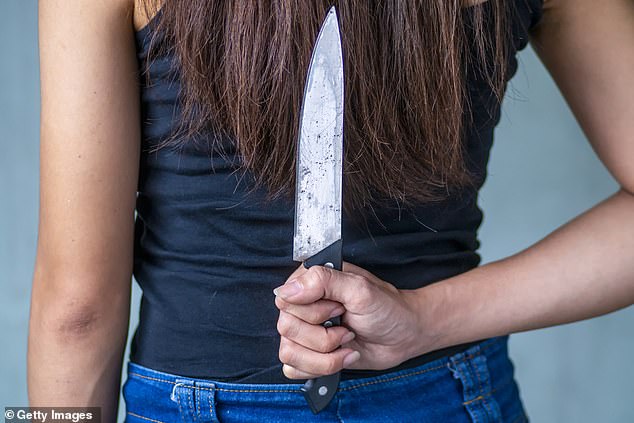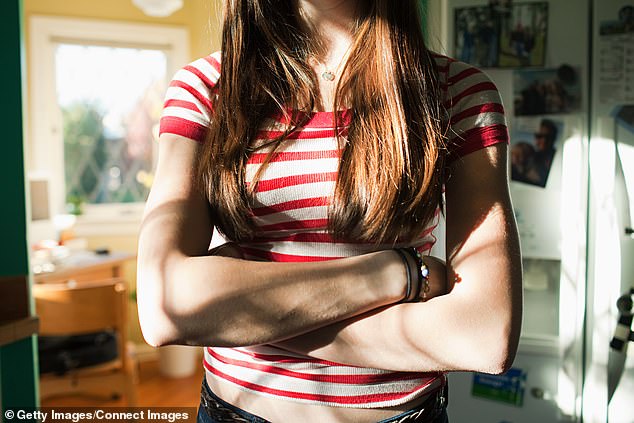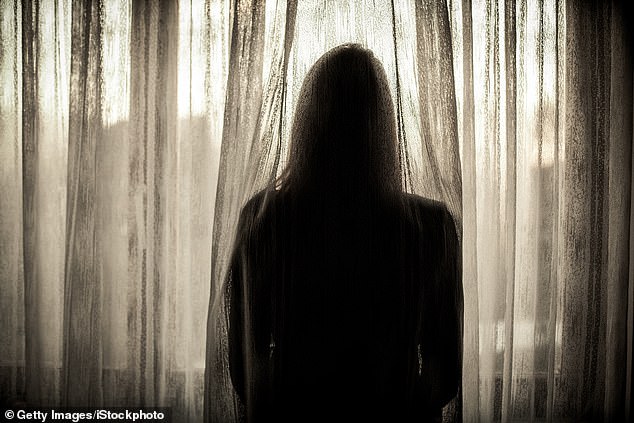Juliet Armitage, a 53-year-old lawyer and mother of three, was cowering in her kitchen when she heard the wail of police sirens.
Clumps of hair had been ripped from her scalp and a bruise was developing along the length of her back where she’d been hurled repeatedly against the floor.
As her assailant was handcuffed, her heart twisted with a familiar mix of anger, love and deep sadness.
For five years, Juliet has been in an abusive relationship and at times the victim of unimaginable levels of violence. ‘Whenever police arrive, they seem shocked that something so awful could be happening,’ she says.
Yet the perpetrator isn’t her adult partner. Had it been, she’d have left the relationship many years ago, or forced him out of her beautiful five-bedroom home in a quiet cul-de-sac. Instead, it’s her 16-year-old daughter Lizzie.
To the outside world, Lizzie is confident and popular, an A-grade student and loyal friend. Yet she has also wished her mother dead and left her with a broken finger, black eyes, a ruptured salivary gland and whiplash.
‘I’m on edge, living in fear,’ says Juliet. ‘I feel every emotion it’s possible to feel towards Lizzie, from intense love to loathing.’
Child to Parent Abuse (CPA) such as this is the least discussed – and most taboo – form of domestic violence.

To the outside world, 16-year-old Lizzie is confident and popular, an A-grade student and loyal friend. Yet she has also wished her mother dead and left her with a broken finger, black eyes, a ruptured salivary gland and whiplash
When your abuser is your own flesh and blood, how can you extricate yourself? If it’s a vulnerable child breaking your bones, what would it take to walk away?
Yet it is on the rise. This month, figures from Femicide Census, which campaigns against violence against women, found more women were killed by their sons than a stranger in 2022.
Pegs (Parental Education Growth Support), an organisation for those affected, has seen a 112 per cent increase in parents and related professionals seeking advice for CPA in the past year.
The worsening mental health crisis, public-sector funding cuts, and the cost-of-living crisis ‘may well’ be behind the rise, says founder Michelle John. Neurodevelopmental conditions that can affect emotional regulation such as ADHD are also cited as triggers, while awareness of CPA may be persuading more parents to seek help.
But, stresses John, ‘it’s often impossible to pinpoint one factor which “causes” CPA’.
‘Often, there are numerous, interwoven, complex factors, or seemingly no “cause” at all.’
Many parents supported by Pegs are ‘solicitors, teachers, doctors or in other highly trained roles’, she adds, with the ‘overwhelming’ majority feeling ‘ashamed, guilty and isolated’.
Juliet has run the gamut of emotions since Lizzie’s violence began in 2020. Before that, she was a conscientious girl who loved Disney films. She could be forgetful and cheeky, Juliet says, but ‘we were always close’. As she started secondary school, however, her personality suddenly changed.
Juliet has two older sons with her ex-husband, who are now 19 and 17, and has been in a relationship with Simon, 61, a management consultant, for ten years. Both her boys are ‘polite and gentle’ children who made the transition to ‘big school’ with no problems at all, so this was a new situation for her.

Juliet couldn’t understand why her daughter’s behaviour was so much better on her weekly visits to her dad, from whom she had split when Lizzie was five (posed by model)
At first, when Lizzie ‘started answering back, telling me to “shut up”’, Juliet attributed her daughter’s behaviour to the disruption of the pandemic. But 11-year-old Lizzie grew increasingly naughty in ways that couldn’t be explained by social isolation.
One weekend that November, she swiped alcohol from her aunt’s drinks cabinet and came home drunk. ‘I told her off,’ says Juliet. ‘She went straight to her bedroom and slammed the door.’
Moments later, Lizzie started throwing the contents of her bedroom down the stairs in a fury: ‘Toiletries, chairs, I couldn’t believe it.’
As Juliet held her hands out to protect her face, a bottle of perfume hit her finger, bending it back with such force it broke. ‘I felt an intense throbbing. It became twice the size and turned purple.’
The more a shocked Juliet tried to remonstrate with Lizzie, the more she withdrew, crying herself to sleep on the sofa.
Juliet’s ex-husband, a doctor with whom she is on good terms, strapped up her finger – ‘he treats a lot of my injuries’, she says wryly – and she quickly forgave Lizzie.
‘She was my little girl. I wasn’t frightened of her at that point. I put it down to the alcohol.’
Yet Lizzie’s moods grew darker. ‘I’d be talking to her in her bedroom and it would be as if someone had taken over her body,’ she recalls. ‘She’d say, “Get out, you annoy me, you’re a b***h”.’
In whispered conversations when the children were in bed, she and Simon agonised over her behaviour.
‘We wondered if it was early puberty, or if she was depressed or anxious, or if anything she was watching online was affecting her mood,’ says Juliet, who deleted Snapchat from Lizzie’s phone – the only social media she used – ten times, lest it was affecting her mental health. ‘But she always found a way to get it back.’

Lizzie’s moods grew darker. ‘I’d be talking to her in her bedroom and it would be as if someone had taken over her body,’ Juliet recalls. ‘She’d say, “Get out, you annoy me, you’re a b***h”’
Lizzie’s brothers, then 12 and 14, both lived in the house and were just as shocked by her violent temper. Why was this girl who had been brought up in exactly the same environment so different to her studious, well-behaved siblings?
And why was her behaviour so much better on her weekly visits to her dad, from whom Juliet split when Lizzie was five?
Relations were perfectly amicable between Juliet and her ex, and indeed they often spent Christmases together with the children so, according to Lizzie, ‘there was no question of any trauma connected to that’.
In January 2022, Juliet moved Lizzie to a private school near their home in Yorkshire in the hope smaller class sizes would keep her calmer. ‘But she hated the fact I’d taken her away from her friends,’ says Juliet. ‘I think that made her angrier towards me.’
And her temper was by now on a hair-trigger. Shortly afterwards, when Juliet asked Lizzie to put away her phone one evening, Lizzie lunged for her.
‘She wound her hands in my hair and pulled it out and punched me in the face. Her strength was frightening.’ Adrenaline prevented pain in the moment. ‘But afterwards my head and neck hurt, from where I’d been shaken.’
Stunned, Juliet struggled free and asked Lizzie why she had attacked her. ‘She shouted at me to leave her alone. I said I wouldn’t until I’d had an explanation and an apology. She pushed me out of the room. This time, I told Simon to call the police.’
Lizzie was hiding under her bed when two female officers arrived. ‘She looked so tiny. I felt so guilty,’ says Juliet, who refused to let the officers arrest Lizzie, hoping their visit alone would prove a wake-up call.

Juliet moved Lizzie to a private school near their home in Yorkshire in the hope smaller class sizes would keep her calmer. ‘But she hated the fact I’d taken her away from her friends,’ says Juliet. ‘I think that made her angrier towards me’
‘She admitted everything. She didn’t say why she did it – just that she got angry,’ says Juliet, who went to work the next day with a black eye. It wouldn’t be the last time, though now ‘I generally keep myself hidden away if I’ve got black eyes’.
Lizzie’s GP referred her to the hugely over-subscribed CAMHS (Child and Adolescent Mental Health Services) which eventually offered 12 weeks of online therapy. Yet Lizzie refused to speak in the sessions.
‘So she was discharged,’ says Juliet, who then paid privately for Lizzie to see a psychiatrist and a paediatrician. In August 2022, Lizzie was diagnosed with ADHD.
‘I wasn’t surprised,’ says Juliet, who believes the condition ‘possibly’ accounts for her daughter’s violence. ‘Meltdowns are associated with neurodivergence. It was a relief to put a label on it.’
Lizzie was prescribed Ritalin, which she told her mother made her ‘nicer’ but, says Juliet, ‘the effects only lasted a few weeks so I think it was mainly psychological’.
And the violence now ‘snowballed,’ she adds. ‘Once she bit me on the wrist so hard I thought she was going to spit a chunk of my flesh out. She bit my breast, leaving teeth marks.
‘Her mood could change in the course of a sentence, usually caused by something to do with her phone, her wanting money, or a lift somewhere. It was never a case of me screaming, or a significant row. It felt I was walking on eggshells.’
Attempts at discipline only exacerbated the violence. Once, when Juliet tried to stop Lizzie leaving her room by sitting on her bedroom floor with her back to the door, Lizzie jumped up and down on her head with such force she ruptured her mother’s salivary gland.
‘My face was swollen for days,’ she says. ‘Now, I remove myself from the situation and don’t talk to her until she regulates again.’

The violence of the past five years has irrevocably changed Juliet. ‘I have PTSD. My heart leaps into my chest at the sound of banging noises’
That year, 2022, her eldest son – then 16 – left to live with his father. ‘He thought he was going to hurt Lizzie because he didn’t want to see her hurting me. I was gutted but relieved that he was out of the picture. He had tried to physically hold her back when she went for me and I didn’t want him involved.’
Simon, meanwhile, admits he finds it ‘difficult’ watching the woman he loves being assaulted. But Juliet has instructed him not to intervene: ‘I am petrified she will say he’s tried to hurt her.’
In January 2023, Lizzie was expelled from her private school for telling a teacher to ‘f*** off.’ Since then, Juliet has had to work from home and paid for a tutor to home school Lizzie. ‘I’ve spent at least £20,000 on a tutor and repairing damage Lizzie has done to the house,’ she says.
Mother’s Day that year, she recalls, was a terrible new low. Lizzie pinned her to the floor and kneed her repeatedly in the eyes.
‘I started seeing flashing lights in my peripheral vision,’ says Juliet. Her optician found a hole in her retina. The damage, an ophthalmologist told her, would be permanent.
Now Juliet adapted her house to minimise risk. ‘Knives are locked away. All bedroom doors apart from Lizzie’s have locks on. I’m in a constant state of high alert.’
Once, when Juliet refused to give Lizzie a lift to her friend’s house, ‘she said: “You need to sleep with one eye open, because I’ll be here to stab you.”’
‘She said it very calmly, which I found chilling. In the heat of the moment she might be tempted.
‘Sometimes I think she is off-the-scale psychopathic, sociopathic, schizophrenic. But then, within an hour, she’ll be fine.’
Her ex-husband, is ‘open to every possibility’ she says. ‘As a doctor he knows more than me. At first he thought it was my parenting, but when I put it to him I had raised two polite and measured boys, he realised it wasn’t.’
Juliet has installed cameras in every downstairs room and keeps pictures of her injuries ‘to document what she’s doing, to keep us safe’.
Over the past three-and-a-half years, she has called police half a dozen times – although they have only arrested Lizzie once.
Last August came that horribly violent incident where Juliet’s hair was pulled out. The trigger this time was Juliet refusing to pay for Lizzie’s hair appointment – it was the one remaining form of control she had over her daughter, who wanted to go to a festival in London but refused to tell a worried Juliet who she was going with.
Enraged, Lizzie punched the side of Juliet’s head while the two were in the car, and as they entered the house, ‘she smashed the front door, grabbed my hair, threw me to the floor and smashed my head against the floor’.
Lizzie, who was then 15, then threw a mirror over the upstairs banister. ‘My younger son put his hands up to stop himself being slashed and lacerated his fingers,’ recalls Juliet.
‘Then she started throwing other stuff down the stairs – a chair, table, her curtain rail, bin, absolutely everything. There was glass everywhere.’
Juliet dialled 999. Police told her to get out of the house. But, she says, ‘I didn’t want to leave her. I didn’t want her to harm herself. Then she came at me with a metal curtain pole.’
She and her son locked themselves in the kitchen as Lizzie tried to batter down the door with the pole. Blood from her son’s fingers, which would have to be stitched back together, dripped onto the floor.
By the time police arrived, Lizzie’s anger had subsided.
‘She held out her hands to be cuffed,’ recalls Juliet. Lizzie was arrested for actual bodily harm against her brother, common assault against Juliet, and causing criminal damage. Juliet made a statement against her daughter for the first time, ‘mostly because her brother had been hurt. It had only ever been me before’.
After 24 hours in a police cell, Lizzie was released on bail on the condition she didn’t contact Juliet, and was placed in foster care – yet Juliet requested the bail conditions were lifted so she could speak to her daughter on video call. ‘I missed her. She was still my daughter.’
Lizzie was charged in November, but came home the following month. ‘Although she didn’t apologise she was the perfect child. She said she realised I was the person who loved her the most,’ says Juliet.
Last February, Lizzie saw a psychologist who diagnosed her with autism as well as ADHD – again, not a surprise, says Juliet, explaining that her daughter’s extreme risk taking is a known trait. As for how much her autism is responsible for the abuse, Juliet is unsure. ‘It’s very difficult to separate what is actually her own personality.’
On the eve of Lizzie’s trial this March, Juliet told police she would no longer give evidence against her daughter.
‘If some of the abuse was down to autistic meltdowns, I didn’t want to criminalise something beyond her control.’
The case collapsed – and although Lizzie hasn’t been physically violent to Juliet since, she continues to verbally abuse her. ‘She’s specific about what she hopes will happen to me,’ says Juliet.
‘She says “Mum, I hate you so much, I hope when you’ve dropped me off with my friend and I’m out of the car safely and you’ve turned the corner, there’s a big lorry coming towards you, and you crash.”
‘She’s written on her bedroom mirror, “I hope you die, b***h.”’
Lizzie has just started college but rarely leaves her room at home. ‘She eats all her meals there. She barks orders. I know if I don’t make her food, there’ll be an incident. Or she’ll ask me to buy her something and I’ll have to buy it or she’ll smash the place up,’ says Juliet.
The violence of the past five years has irrevocably changed her. ‘I have PTSD. My heart leaps into my chest at the sound of banging noises.’
There are still no definitive reasons for Lizzie’s behaviour – and Juliet can only conclude it’s a mixture of personality, neurodivergence and difficulty expressing emotions in any other way than extreme anger.
Despite it all, Juliet loves her daughter.
‘There are moments when she’s kind and loving – when she asks me to get into her bed and watch a film together. I adore her. I feel desperately sorry for what’s going on in her head. I would die for her.’
- Names and some details have been changed.
- See pegsupport.co.uk












